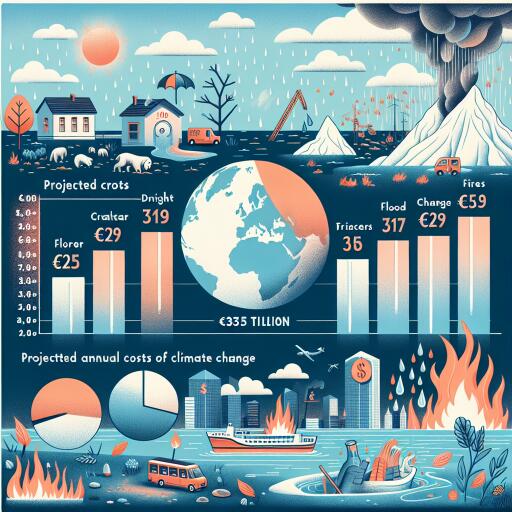
Annual Costs From Climate Change Set To Total €35 Trillion: Study | ESM Magazine
The global economy is bracing for a staggering toll as a result of climate change, with estimated annual damages reaching up to €35.61 trillion ($38 trillion), suggesting a severe reduction in global income by 19%. This alarming figure was revealed in a recent study conducted by the Potsdam Institute for Climate Impact Research (PIK), highlighting the extensive and costly repercussions of climate change across the globe.
Notably, the financial implications of climate change are expected to persist through 2050, even if carbon dioxide emissions are significantly curtailed starting immediately. This points towards a long-term challenge that nations around the globe will have to navigate, irrespective of their efforts to mitigate climate impacts in the coming years. The study, which was published in the esteemed Nature journal, sheds light on the far-reaching economic ramifications of climate change.
One of the study’s striking findings is the disproportionate impact on countries with lesser contributions to the root causes of climate change. These nations are projected to face income reductions 60% greater than those of wealthier countries and 40% greater than the countries with the highest emissions. “Regions including North America and Europe are set to face significant economic strain, but South Asia and Africa will bear the brunt of the impacts. These effects span various economic sectors, from agriculture and labour to infrastructure,” highlighted a leading PIK scientist, Maximilian Kotz.
The extensive study projects global annual damages from climate change to range between €17.8 trillion ($19 trillion) and €55.3 trillion ($59 trillion) by mid-century. This variance depends on the success of global efforts to mitigate climate change and on future environmental conditions, including changes in rainfall patterns and temperature fluctuations.
To arrive at these conclusions, researchers at PIK analyzed empirical data collected from over 1,600 regions across the world over the last forty years. This comprehensive analysis aimed to assess how shifts in climatic conditions could impact economic growth moving forward. “Our findings indicate that nearly all countries, regardless of their development level, will suffer substantial economic damages within the next 25 years. This includes developed countries like Germany, France, and the United States,” shared PIK scientist Leonie Wenz, the lead author of the study.
The insight provided by this research emphasizes the immediacy and scale of the economic losses attributed to climate change, spurred by emissions from the past. “To mitigate some of these damages, it’s imperative that we bolster our adaptive measures. Moreover, to curb the escalating costs in the latter half of the century, a drastic and immediate reduction in emissions is essential,” Wenz asserted, shedding light on the critical need for both adaptation and formidable mitigation strategies to address the impending economic challenges posed by climate change.
This comprehensive study by the Potsdam Institute for Climate Impact Research offers a dire warning: the economic impacts of climate change are not looming in the distant future; they are immediate, widespread, and costly. It calls for urgent and decisive action from global leaders to implement robust mitigation strategies, drastically reduce emissions, and prepare for a future that is already at our doorstep.





Leave a Reply